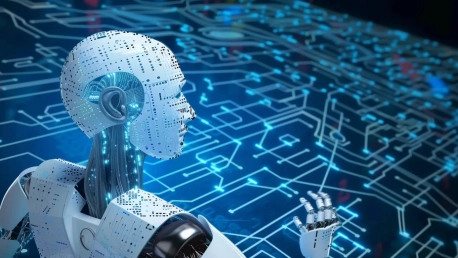The COVID-19 pandemic marked a pivotal moment for the education sector, acting as a catalyst for major shifts toward digital transformation. Traditional educational systems are increasingly integrating cutting-edge technologies such as Artificial Intelligence (AI), Blockchain, and the Internet of Things (IoT). These advancements promise to revolutionize education by addressing longstanding challenges like limited access to quality education, resource shortages, and administrative inefficiencies. As these technologies converge, they are enabling a transition from traditional learning systems to high-tech educational platforms that are more efficient, secure, and responsive to individual student needs.
AI’s Role in Personalized Learning
Artificial Intelligence is at the forefront of transforming personalized learning experiences in education. Traditional educational methods often adopt a one-size-fits-all approach that fails to cater to the individual strengths and weaknesses of students. AI disrupts this norm by offering tailored learning experiences that can significantly enhance educational outcomes. AI-powered tutoring systems continuously assess and adjust to a student’s performance, customizing lessons to fit their learning pace and capabilities. This individualized approach ensures that students can learn more effectively, resulting in improved academic performance and a deeper understanding of the subject matter.Beyond personalized learning, AI also plays a crucial role in streamlining administrative tasks within educational institutions. AI-driven chatbots facilitate communication between students and administrative staff, leading to more responsive and efficient processes. This reduction in administrative burden allows educational institutions to focus more on their core mission of delivering quality education. The rise in the AI in education market, which is expected to grow dramatically from $1,306 million to $3,165 million by 2031, reflects the increasing reliance on AI for educational advancements. These tools provide real-time data-driven insights that help educators make informed decisions, ultimately elevating the overall educational experience.
Blockchain’s Impact on Data Security and Privacy
Blockchain technology offers robust solutions to address data privacy and cybersecurity issues within the educational sector. Traditional record-keeping methods are often susceptible to tampering and unauthorized access, posing significant risks to sensitive student information. Blockchain provides a secure and immutable framework for verifying academic credentials, ensuring that records are decentralized and tamper-proof. This increased security not only protects sensitive student data but also enhances the integrity and trustworthiness of academic records.By employing blockchain technology, educational institutions can confidently handle sensitive information such as student records without fear of data breaches and cyberattacks. This technological advancement bolsters the reliability and credibility of the education ecosystem, making it easier for institutions, employers, and other stakeholders to verify academic credentials. As the digital landscape of education continues to evolve, the adoption of blockchain technology becomes foundational for creating a secure, trustworthy educational environment where data integrity is preserved, and privacy concerns are mitigated.
IoT and the Evolution of Smart Classrooms
The Internet of Things (IoT) significantly contributes to the creation of smart classrooms, transforming traditional educational settings into interactive and engaging learning environments. IoT devices and sensors monitor various environmental conditions, manage energy consumption, and track real-time student engagement. This interconnected environment facilitates immersive learning experiences, providing immediate feedback and hands-on learning opportunities that enrich the educational experience. The real-time data collection through IoT devices enables adaptive learning solutions, allowing educators to tailor educational content to match student needs and engagement levels.With IoT, classrooms become dynamic spaces where learning is optimized through continuous monitoring and adjustment. For example, smart sensors can maintain ideal lighting and temperature conditions, thereby creating a comfortable learning environment. Additionally, real-time student engagement tracking permits educators to identify students who may need additional support or intervention, leading to more personalized and effective teaching strategies. This significant step toward creating smart classrooms underscores IoT’s role in evolving education systems to be more future-ready and responsive to individual student needs.
The Financial Impetus for Technological Integration
Holon IQ, as cited by the World Economic Forum, projects a massive investment of $10 trillion in the global education sector over the next decade. This substantial financial commitment underscores the anticipated pivotal role that AI, Blockchain, and IoT will play in transforming education. Such investments highlight the importance of continuing to integrate innovative technologies to create more efficient, secure, and personalized educational environments. These financial resources are crucial for developing and implementing high-tech educational platforms that can accommodate the rapidly changing needs of students and educators.This significant financial impetus supports the ongoing shift from traditional to digital education, promising a future where educational experiences are more tailored and effective. As technological innovations become increasingly embedded in educational systems, the benefits of these investments are expected to ripple through the sector, accelerating major advancements that address historical inadequacies. This wave of investment not only sets the stage for technological integration but also signals a broad acknowledgment of the transformative potential these technologies hold for education.
Moving Towards a Personalized and Student-Centric Education
The COVID-19 pandemic signaled a crucial turning point for the education sector, acting as a powerful driver for extensive digital transformation. Traditional educational systems are increasingly incorporating advanced technologies such as Artificial Intelligence (AI), Blockchain, and the Internet of Things (IoT). These technological advancements are poised to revolutionize the education landscape by tackling long-standing issues like limited access to quality education, shortages of resources, and administrative inefficiencies. As these technologies merge, they are facilitating the shift from conventional learning models to sophisticated, high-tech educational platforms. These new platforms are designed to be more efficient, secure, and responsive to the individual needs of students. By embracing these technologies, educational institutions aim to create a more accessible and personalized learning experience for all students, ensuring that the traditional barriers to education are overcome and paving the way for a more innovative future in education.









